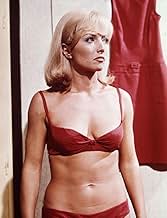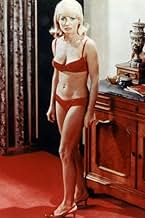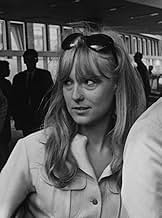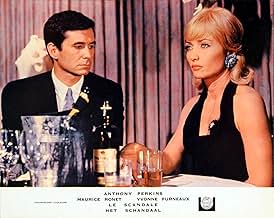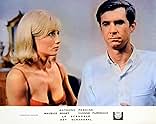Le scandale
- 1967
- Tous publics
- 1h 45min
NOTE IMDb
5,8/10
911
MA NOTE
Ajouter une intrigue dans votre langueA champagne tycoon's (Furneaux) partner (Ronet) suspects his partner's gigolo husband (Perkins) of murders he's been framed for.A champagne tycoon's (Furneaux) partner (Ronet) suspects his partner's gigolo husband (Perkins) of murders he's been framed for.A champagne tycoon's (Furneaux) partner (Ronet) suspects his partner's gigolo husband (Perkins) of murders he's been framed for.
- Réalisation
- Scénario
- Casting principal
- Récompenses
- 1 victoire au total
Henri Attal
- Attacker in Dark Coat
- (non crédité)
Robert Burnier
- General at Evelyn's Party
- (non crédité)
Colin Drake
- Evelyn's Party Guest
- (non crédité)
Pierre Gualdi
- Bishop at Evelyn's Party
- (non crédité)
Raoul Guylad
- Customer at Denise's Shop
- (non crédité)
Catherine Langeais
- Evelyn's Party Guest
- (non crédité)
Denise Péronne
- Party Guest Who Had Met Christopher
- (non crédité)
Avis à la une
This bizarre but intriguing opus from what is traditionally referred to as his 'fallow' period, turns out to be the template for most of Claude Chabrol's subsequent output. He is often compared to Alfred Hitchcock and ironically this film has been made for Universal Studios which accounts for the presence of Anthony Perkins from 'Psycho' and Henry Jones from 'Vertigo'. It is to be lamented that the dubbed American version has been cut by about seven minutes so as to blunt the sexual aspects, not least the homoerotic element between Christopher and Paul.
Although not quite as polished and well-crafted as his later films in this genre there are some stylistic flourishes not least the showy overhead final shot and is eminently watchable thanks to its talented and attractive leading players. Anthony Perkins in his first of two films for this director, employs his boyish charm and inherent quirkiness to fullest effect whilst Maurice Ronet's performance as the supposedly deranged Paul is a veritable tour de force and arguably one of his finest. On the distaff side is the fabulously feline Yvonne Furneaux whilst Chabrol's wife Stéphane Audran assumes a greater importance here in a double role and would soon take centre stage in his mid-period masterpieces. Slinky Suzanne Lloyd plays Sylvie whose lengthy scene with Ronet is one of Chabrol's most surreal.
Chabrol's 'A' Team is very much in evidence here in terms of the glossy cinematography of Jean Rabier, taut editing by Jacques Gaillard, incisive dialogue by Paul Gégauff and score by Pierre Jansen which on this occasion is alas somewhat intrusive.
This film, for this viewer at any rate, is very much 'work in progress' but displays a refinement of technique that over the next few years would establish Chabrol's reputation as an acknowledged master of the psychological thriller.
Although not quite as polished and well-crafted as his later films in this genre there are some stylistic flourishes not least the showy overhead final shot and is eminently watchable thanks to its talented and attractive leading players. Anthony Perkins in his first of two films for this director, employs his boyish charm and inherent quirkiness to fullest effect whilst Maurice Ronet's performance as the supposedly deranged Paul is a veritable tour de force and arguably one of his finest. On the distaff side is the fabulously feline Yvonne Furneaux whilst Chabrol's wife Stéphane Audran assumes a greater importance here in a double role and would soon take centre stage in his mid-period masterpieces. Slinky Suzanne Lloyd plays Sylvie whose lengthy scene with Ronet is one of Chabrol's most surreal.
Chabrol's 'A' Team is very much in evidence here in terms of the glossy cinematography of Jean Rabier, taut editing by Jacques Gaillard, incisive dialogue by Paul Gégauff and score by Pierre Jansen which on this occasion is alas somewhat intrusive.
This film, for this viewer at any rate, is very much 'work in progress' but displays a refinement of technique that over the next few years would establish Chabrol's reputation as an acknowledged master of the psychological thriller.
Despite the mixed reception it enjoys among both critics and fans of the director, this film can now be seen to have been the one to virtually inaugurate Chabrol's major period; it was actually made in conjunction with Universal, a studio with which his idol Alfred Hitchcock was still tied at the time and, to further stress that connection, he utilized one of the stars from the latter's recent work (Anthony Perkins in the first of two pictures he did for the French director). This co-production arrangement – which even saw eminent American film critic Derek Prouse and character actor Henry Jones figuring among the writers and supporting cast respectively! – resulted in two separate versions: the English-language one running 98 minutes and the French being slightly longer at either 107 or 111, depending on the sources. Unfortunately, the former seems to be the more readily available cut which, incidentally, also fails to give credit to Chabrol's regular scribe Paul Gegauff for his contribution to the clever screenplay!
Though Chabrol had previously dabbled in the thriller genre (including one in color, WEB OF PASSION [1959] that would make for a perfect thematic companion piece), this stylish film – which also brought on a sudden blossoming of his then-wife Stephane Audran's talents, in what initially appears to be a dual role – set him out as European cinema's foremost purveyor of folies bourgeoises (to cite a later, albeit much maligned, title I have been unable to track down for this comprehensive tribute). Even so, this first 'mature' attempt proves a bit uneasy as a whole – owing, in part, to the language barrier but, also, the strained decadent milieu at its core (to get an inkling of the film's overall effect, if Hitchcock had made LA DOLCE VITA [1960], it would have looked something like this!). In fact, the psychological aspect of the narrative (the hero suffers a head injury and undergoes repeated shock treatment, which makes him seemingly prone to blackouts) is rather downplayed in favor of some dreary business dealings which, eventually, descend into blackmail and murder.
With the protagonist made to be an alcoholic playboy – I particularly enjoyed the Bunuel in-joke where the inebriated hero smashes a TV set just as a screening of LA MORT EN CE JARDIN (1956) is about to start! – it was inevitable that Maurice Ronet, who had virtually cornered that particular market ever since playing the suicidal lead in Louis Malle's LE FEU FOLLET (1963), would assume that role here and he went on to win a Spanish acting award for his sterling efforts. In retrospect, given his pedigree, one would have expected Perkins to be the victim of any potential conspiracy but he emerges a schemer here instead which he does very well, mind you, except that in the last sequence we realize he had an accomplice all along who is even more ruthless than he is!
Actually, the revelation with respect to the latter comes across just as 'shocking' as the one at the climax of Agatha Christie's "Witness For The Prosecution" (superbly filmed by Billy Wilder in 1957); that said, death and disguise also come into play at the finale of Chabrol's subsequent release, LES BICHES (1968; also with Audran). Then again, such an audacious open-ended closing shot as one finds here could hardly have been anticipated!
Apart from Audran – not to mention a glossy look (courtesy of the ubiquitous Jean Rabier) which was soon to become a trademark of the Chabrol style – the film boasts a number of other attractive females (including Yvonne Furneaux as Perkins' wife, whose lust for power proves her undoing, Catherine Sola as Ronet's tennis partner and, both as unwitting pawns in the game of murder, voluptuous artist Suzanne Lloyd and Christa Lang, who had previously worked with Chabrol three years earlier in his espionage pastiche THE TIGER LIKES FRESH MEAT and would go on to marry iconoclastic American film-maker Samuel Fuller).
Though Chabrol had previously dabbled in the thriller genre (including one in color, WEB OF PASSION [1959] that would make for a perfect thematic companion piece), this stylish film – which also brought on a sudden blossoming of his then-wife Stephane Audran's talents, in what initially appears to be a dual role – set him out as European cinema's foremost purveyor of folies bourgeoises (to cite a later, albeit much maligned, title I have been unable to track down for this comprehensive tribute). Even so, this first 'mature' attempt proves a bit uneasy as a whole – owing, in part, to the language barrier but, also, the strained decadent milieu at its core (to get an inkling of the film's overall effect, if Hitchcock had made LA DOLCE VITA [1960], it would have looked something like this!). In fact, the psychological aspect of the narrative (the hero suffers a head injury and undergoes repeated shock treatment, which makes him seemingly prone to blackouts) is rather downplayed in favor of some dreary business dealings which, eventually, descend into blackmail and murder.
With the protagonist made to be an alcoholic playboy – I particularly enjoyed the Bunuel in-joke where the inebriated hero smashes a TV set just as a screening of LA MORT EN CE JARDIN (1956) is about to start! – it was inevitable that Maurice Ronet, who had virtually cornered that particular market ever since playing the suicidal lead in Louis Malle's LE FEU FOLLET (1963), would assume that role here and he went on to win a Spanish acting award for his sterling efforts. In retrospect, given his pedigree, one would have expected Perkins to be the victim of any potential conspiracy but he emerges a schemer here instead which he does very well, mind you, except that in the last sequence we realize he had an accomplice all along who is even more ruthless than he is!
Actually, the revelation with respect to the latter comes across just as 'shocking' as the one at the climax of Agatha Christie's "Witness For The Prosecution" (superbly filmed by Billy Wilder in 1957); that said, death and disguise also come into play at the finale of Chabrol's subsequent release, LES BICHES (1968; also with Audran). Then again, such an audacious open-ended closing shot as one finds here could hardly have been anticipated!
Apart from Audran – not to mention a glossy look (courtesy of the ubiquitous Jean Rabier) which was soon to become a trademark of the Chabrol style – the film boasts a number of other attractive females (including Yvonne Furneaux as Perkins' wife, whose lust for power proves her undoing, Catherine Sola as Ronet's tennis partner and, both as unwitting pawns in the game of murder, voluptuous artist Suzanne Lloyd and Christa Lang, who had previously worked with Chabrol three years earlier in his espionage pastiche THE TIGER LIKES FRESH MEAT and would go on to marry iconoclastic American film-maker Samuel Fuller).
This is not really an early Chabrol who had already been making films for over fifteen years but it does come just before he fully got into his stride and his golden period began with Le Boucher. Fascinating here to see Anthony Perkins with Maurice Ronet and the lovely Stephane Audran, not sure if he knew English or was dubbed but he looks fine. Trouble here is that Chabrol takes forever setting this up and we have to spend what seems an interminable amount of time as the rich are seen to party pathetically with their business transactions forever hovering. Once things do get going there are some great scenes and we struggle to make out who is doing what and for why. Could have done with some of that cinematic style early on but certainly worth a watch for the second half. Apparently referenced in Kill Bill 1 and 2 and I'm guessing that it is the final overhead scene shot in retreating fashion that could Tarantino's eye.
Spoiler alert: this review is all spoilers. But this movie is so bad that I don't think it's possible to spoil it any further. A reviewer who has praised the movie asserts that the Anthony Perkins character, Christopher, is in cahoots with the character, or rather characters, played by Stéphane Audran: Audran is Jacqueline when disguised as Christopher's mousy maid and she is the flashy Lydia when not in disguise. Lydia commits a bunch of murders and tries to pin them on Christopher's friend, the character named Paul who is played by Maurice Ronet. Lydia's plan is to benefit financially from the deaths of her murder victims and then live happily ever after with Christopher (why the beautiful and intelligent, albeit ruthless, Lydia would kill in order to be with a loser like Christopher is beyond my comprehension). But if Christopher is in on Lydia's plan, then the scene where he makes a play for Jacqueline and she rejects him makes no sense. Perhaps he could be in cahoots only with Lydia, not realizing that she is also Jacqueline, but that would mean that all it takes for a woman to deceive Christopher is not much more than her wearing of a wig. Christopher's being in cahoots with Lydia would also mean that he would be delighted when he learns that his wife, Christine, played by Yvonne Furneaux, has been murdered, when in fact he is distraught. The entire movie makes very little sense. With the partial exception of Christine, all the main characters are unprincipled and obnoxious people, so it is difficult to have much sympathy for any of them.
CONTAINS A BIG SPOILER Chabrol's transitional period was coming to an end.His
golden era was about to begin,and would culminate two years later with "le boucher".But the transitional period is still here in 1967.
"Le scandale" is nothing short of rubbish.The first hour is meandering and dragging on and on and on:you're going to tell me it's Claude Chabrol 's usual disgust for the bourgeoisie.It would work the following year in "la femme infidele" when Chabrol began with a fly on the wall account of the daily life of those wealthy people.It does not here .Anthony Perkins and Maurice Ronet are wasted and Yvonne Furneaux is undistinguished.Stephane Audran is here too and with her ,comes my big spoiler :so stop reading now if you have not seen the flick (but haven't you got a better way of spending your time anyway?).Anyone who knows Chabrol's works has seen Audran in a lot of films;and you realize that Jacqueline is a Stephane Audran made look ugly ,and the German hostess is the real sexy Audran.When the movie was made,Audran was hardly known in France and the audience could be fooled.No longer.
Chabrol ,in the second part,tried to create suspense and fear ,by suggesting Ronet was going nuts.But it's too late and the ending recalls some of those Joan Crawford extravaganzas ,the likes of "straight jacket" except that you had a good laugh in Castle's movie .Not in Chabrol's dud.
Gastronomist Chabrol fills his quota of good food.Here they treat themselves to some delicious kidneys (not hot enough,one of the guests complains.)
golden era was about to begin,and would culminate two years later with "le boucher".But the transitional period is still here in 1967.
"Le scandale" is nothing short of rubbish.The first hour is meandering and dragging on and on and on:you're going to tell me it's Claude Chabrol 's usual disgust for the bourgeoisie.It would work the following year in "la femme infidele" when Chabrol began with a fly on the wall account of the daily life of those wealthy people.It does not here .Anthony Perkins and Maurice Ronet are wasted and Yvonne Furneaux is undistinguished.Stephane Audran is here too and with her ,comes my big spoiler :so stop reading now if you have not seen the flick (but haven't you got a better way of spending your time anyway?).Anyone who knows Chabrol's works has seen Audran in a lot of films;and you realize that Jacqueline is a Stephane Audran made look ugly ,and the German hostess is the real sexy Audran.When the movie was made,Audran was hardly known in France and the audience could be fooled.No longer.
Chabrol ,in the second part,tried to create suspense and fear ,by suggesting Ronet was going nuts.But it's too late and the ending recalls some of those Joan Crawford extravaganzas ,the likes of "straight jacket" except that you had a good laugh in Castle's movie .Not in Chabrol's dud.
Gastronomist Chabrol fills his quota of good food.Here they treat themselves to some delicious kidneys (not hot enough,one of the guests complains.)
Le saviez-vous
- AnecdotesClaude Chabrol made this film for an American company, Universal, and with some American and British actors in prominent roles. Each scene for the film was filmed in both French and English versions, with the result that it got widely released in Britain and America. The English-language version was mostly scripted by the veteran British film critic Derek Prouse. Chabrol, who spoke excellent English, was able to maintain complete artistic control over the project.
- Citations
Christopher: [to Christine who is trying to seduce him] I'm sorry darling. I don't really feel too well. I'm tired. It's always like this when I haven't had enough television.
- ConnexionsReferenced in Kill Bill: Volume I (2003)
Meilleurs choix
Connectez-vous pour évaluer et suivre la liste de favoris afin de recevoir des recommandations personnalisées
- How long is The Champagne Murders?Alimenté par Alexa
Détails
- Date de sortie
- Pays d’origine
- Langue
- Aussi connu sous le nom de
- The Champagne Murders
- Lieux de tournage
- Atlantic Hotel, St. Georg, Hambourg, Allemagne(Hotel where Wagner's stays.)
- Société de production
- Voir plus de crédits d'entreprise sur IMDbPro
- Durée1 heure 45 minutes
- Mixage
- Rapport de forme
- 2.35 : 1
Contribuer à cette page
Suggérer une modification ou ajouter du contenu manquant

